What is Upper Respiratory Disease in Guinea Pigs?
This is a disease that if not attended to quickly, can cause death. It is sometimes confused with the ‘flu’ and owners might expect it to go away in a couple of days, but this is actually something very alarming. It occurs when a bacteria or virus enters the respiratory system and affects the normal function. This leads a vast array of signs and symptoms that can be confused for something less severe.
It is possible that upper respiratory disease happens frequently because guinea pigs have a mandible that is flared caudally and so allows for a broader access to the upper airway structures. Bacteria and viruses can easily enter cause damage to the upper respiratory organs which include the nose, nostrils, nasal cavity, mouth, pharynx and larynx.
What Causes This Disease?
Upper respiratory disease can be caused by different pathogens. The most common are Bordetella, Streptococcus, and adenovirus (Harkness, 2002). It is transmitted by close contact, air, or bedding. The bacteria can adhere to the respiratory organs and enter the cell. They are able to evade immune responses inside the cell and allow themselves to reproduce. There are tiny hairs inside the upper respiratory organs called cilia which help push and capture mucous and debris so that it doesn’t migrate to the lower respiratory organs (Brewer, 1997). Cilia begin to die off when there is bacterial or viral colonization inside the cells, and this affects the breathing quality of the guinea pig. If infected with Streptococcus bacteria, other symptoms such as torticollis, ocular discharge, dyspnea or cyanosis can be detected. The enlargement of cervical lymph nodes is also a very notable sign of this disease.

Signs and Symptoms
This can be subclinical, meaning there are no evident symptoms and make it harder to detect. It can progress quickly and develop severe symptoms from 24 to 72 hours after being infected (Harkness, 2002). Depending on the pathogen that causes this condition, signs and symptoms can vary. The incubation period can range from 1 to 14 days if it is Bordetella and 24 to 72 hours if it is Streptococcus.
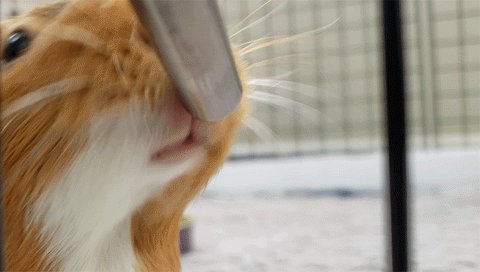
Loss of appetite or drinking water, weight loss or anorexia can also be symptoms of upper respiratory infection, as well as dehydration, lethargy, sneezing, coughing and there might be signs of otitis such as pushing their head sideways against caging. This means they are showing discomfort in their ears. Mucus secretion can also be seen coming from the upper respiratory organs such as the nostrils or the mouth after coughing. If you find that your guinea pig is showing any of these symptoms, remove the bedding in their cage and minimize handling or any other situation that can cause stress such as loud environments or being close to other animals.
How is This Disease Diagnosed?
A veterinarian must take either blood or saliva samples to determine if there is presence of a pathogen in your guinea pig. Bacterial culture is one method that can be used and consists of collecting a sample from the respiratory system, which can be done using a cotton swab. It is then put in a Petri dish and grown over a couple of days until there are enough and can be analysed through a microscope to determine what species of bacteria it is.

PCR is another test that can confirm the presence of a pathogen because it detects if it is there in the present moment and if it is the cause of disease. ELISA, another diagnostic technique, uses the antibodies that the body produces when exposed to a pathogen. This means that ELISA does not detect if the pathogen is present in the current moment, but only tells if the body has been exposed in the past couple of months (JPC, 2020). The veterinarian will recommend the best test to identify the pathogen to begin attacking it at once. Not all bacteria have the same virulence (the ability to develop disease) and this is why it must be tested before the situation is correctly handled. An antibiogram can also be done to figure out what antibiotics are best for the specific strain of bacteria the patient is dealing with.
What Available Treatments Are There?
Depending on the condition that the guinea pig is in when the pathogen is detected, treatment options can vary. It is recommended to begin with fluid therapy and in some cases, forced feeding. Forced feeding is a topic that has been debated on quite frequently, however, sometimes it is absolutely necessary because the absence of food in the stomach can lead to conditions that can worsen the patient’s prognosis. Vitamin C is another treatment option together with antibiotics such as fluoroquinolones, sulfonamides depending on the strain of bacteria that the guinea pig has. It is important to Vitamin C in your guinea pig's diet, to boost immunity and avoid infections that guinea pigs are more likely to have. A great snack for boosting Vitamin C is bell peppers and GuineaDad Nourish Series Herbal Supplements in Rose Hip.

How Can I Prevent This Disease?
The best way to prevent upper respiratory disease in a guinea pig is by providing good options for bedding. Avoid using pine or cedar wood shavings as they can cause irritation and skin issues. Consider using GuineaDad Liners, which were specifically designed to minimize the chance of contracting bacteria related diseases such as upper respiratory infection. These might cost a bit more upfront but will definitely help you save money in the long run and ensure guinea pigs living their lives to the fullest.
It is also very important to keep your guinea pig’s cage as clean as possible to avoid gases building up and causing irritation to the mucous membranes of the respiratory system. Remember, even if your guinea pig doesn’t have any clear signs or symptoms that worry you, always try to take them to the veterinarian at least once every six months to get a check up and make sure everything is okay.























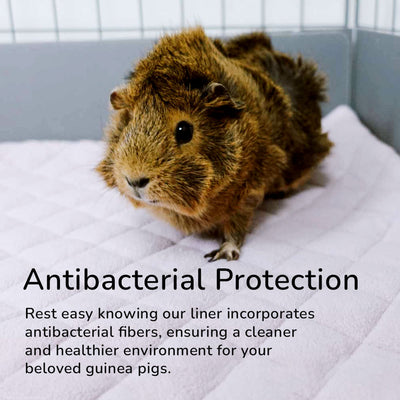
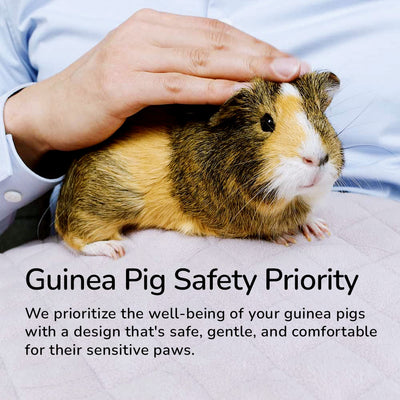




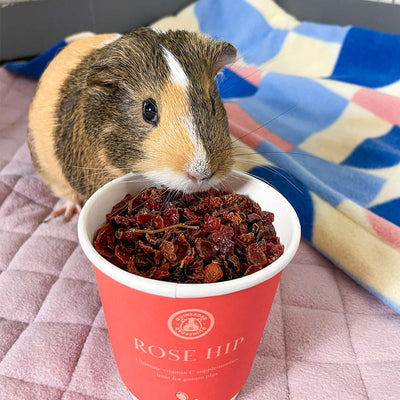

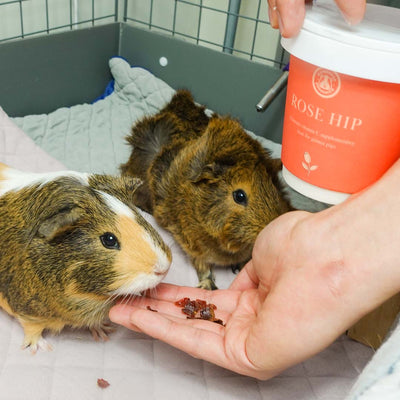




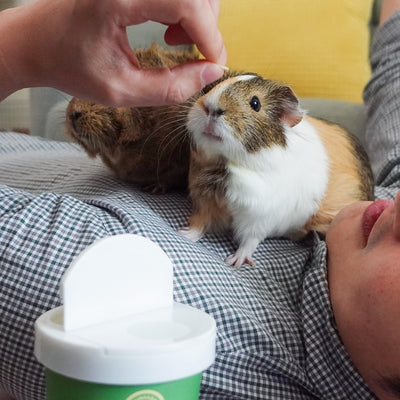
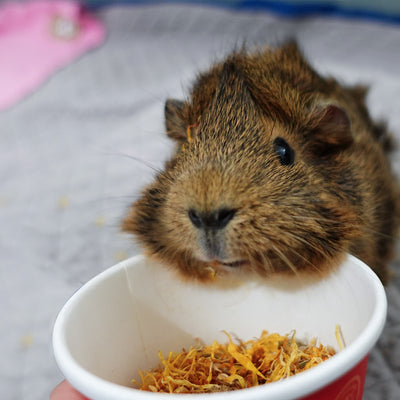


13 comments
Hi Kristen – First and foremost, I’m sorry to hear that you’re not feeling well and I understand your concerns for your guinea pigs. Here are a few things to consider and some actions you can take:
Zoonotic Transmission: Many human illnesses are not transmissible to guinea pigs. The common cold and flu viruses that affect humans don’t typically affect guinea pigs. However, there are certain bacterial infections, like bordetella (a cause of kennel cough in dogs), that can be shared between humans and guinea pigs. It’s always wise to err on the side of caution.
Continue Good Hygiene Practices:
Keep washing your hands thoroughly before and after handling them or their equipment.
If you can, wear a mask when you’re near them to reduce the risk of transmitting any potential pathogens.
Avoid sneezing or coughing near their cage.
Limit Direct Interaction: Until you’re feeling better, limit your direct interaction with your piggies. This might be hard, especially when you want to comfort and check on them, but it’s for their best.
Ventilation and Air Purifier: Good ventilation can help reduce any potential airborne contaminants. Your use of an air purifier is a great idea, especially if it has a HEPA filter.
Monitor Their Health: Pay close attention to any changes in your guinea pigs’ behavior or health. If they’re eating, drinking, and behaving as usual, that’s a good sign. If you notice any symptoms like lethargy, difficulty breathing, or reduced appetite, it would be a good idea to consult with a veterinarian.
Consult a Vet: Even if they seem fine, if you’re very concerned, a call to your vet might put your mind at ease. They might have additional recommendations specific to your situation.
Stay Calm: Stress can indeed have an effect on a guinea pig’s health. But remember, they are resilient animals. As long as you take precautions and keep a close eye on them, there’s a good chance they’ll be just fine.
Lastly, make sure you also take care of yourself. See a doctor if your symptoms persist or if you’re concerned about your illness. Rest, hydrate, and hopefully, you’ll be back to your normal self soon.
I am suddenly very sick with a sore throat and headache. I just put my 2 boars thru the bonding process which I know is stressful for them and I was handling them 2 days ago and snuggling with them. Luckily, I had to work and was unable to gold them yesterday. I felt the symptoms coming on last night and so i chose to keep a distance amd wear a mask today when i nedded to pick them up. I always wash my hands before I touch them or their stuff, but now I’m concerned I’ve passed this on to them. I’ve placed an air purifier in my room right by the cage. Is there anything else I can do to keep my piggies safe? I’m so worried I’ve infected them and then adding in the stress they’ve gone thru makes me fear the worst. What should I do?
Hi Jayne – Upper respiratory infections (URIs) in guinea pigs are typically caused by specific pathogens, such as bacteria or viruses. While some URIs can be transmitted between guinea pigs, it is unlikely for a human to directly spread a URI from their guinea pig to another guinea pig.
The transmission of URIs in guinea pigs usually occurs through close contact between infected and susceptible individuals. Guinea pigs are more likely to contract respiratory infections from other guinea pigs or through indirect contact with contaminated objects or environments.
However, it is still important to practice good hygiene and take necessary precautions when handling guinea pigs, especially if they are sick. Wash your hands thoroughly before and after handling guinea pigs, particularly if they are exhibiting signs of illness. Avoid direct contact between healthy and sick guinea pigs to prevent the potential spread of any pathogens.
If you suspect that your guinea pig may have a URI or any other health issue, it’s best to consult a veterinarian for an accurate diagnosis and appropriate treatment. Veterinarians who specialize in small animals, including guinea pigs, can provide the best guidance and care for your pet.
Can a URI be spread from a human who’s guinea pig has a URI, to my healthy piggy if he holds her? (I hope that makes sense)
Can heavy use of air fresheners, plug-ins and other fumes adversely affect my guineas respiratory health?